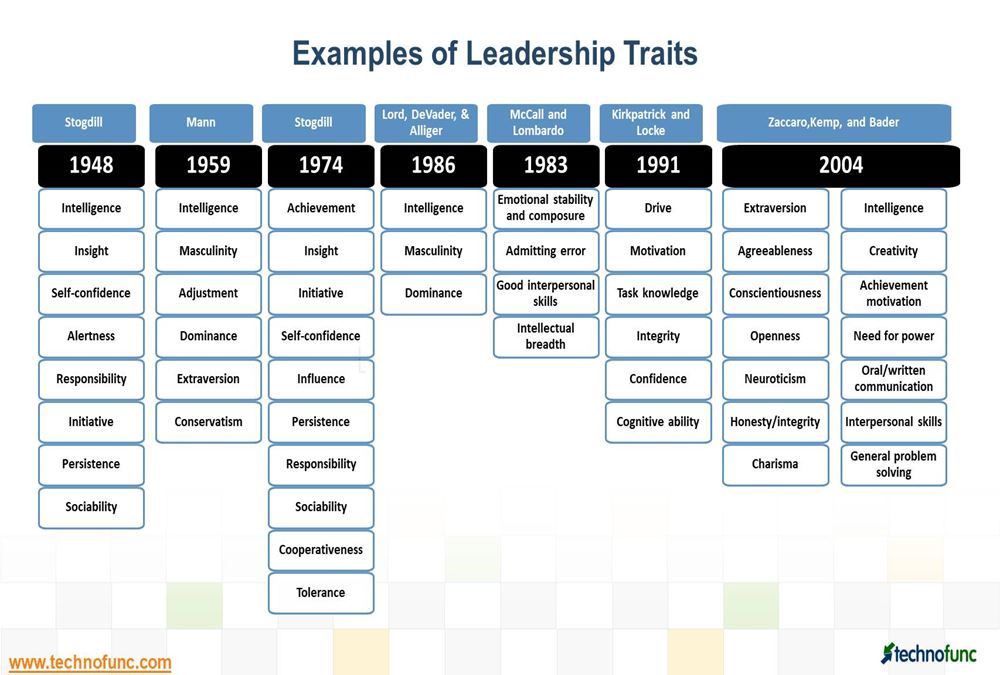- Home
- Business Processes
- Industry Knowledge
- Aerospace Industry
- Automotive Industry
- Banking Domain
- BFSI Industry
- Consumer/ FMCG Industry
- Chemicals Industry
- Engineering & Construction
- Energy Industry
- Education Domain
- Finance Domain
- Hospitality Domain
- Healthcare Industry
- Insurance Domain
- Retail Industry
- Travel and Tourism Domain
- Telecom Industry
- Leadership Skills
- eLearning
- Home
- Leadership Skills
- Leadership Theories
- Leadership Traits – A great List
Leadership Traits – A great List
What are the qualities and characteristics of a good leader? Great leaders possess core leadership traits and skills. The list includes the most important leadership qualities and skills to look for in a great leader. These are must-have traits of a powerful and successful leader, the qualities a leader possess to be great.
A broad classification to six categories of traits is also done below:
Physical Characteristics of the Leader:
- Age
- Height
- Weight
- Alertness
- Energetic
- Masculinity
- High energy level
- Physical stamina
- Tolerance for stress
- Not concerned about being overworked
- Vitality
Background Characteristics of the Leader:
- Education
- Social Status
- Mobility
- Experience
- Experience in a variety of different types of situations
- Broader perspective
- Expertise in dealing with different types of problems
- Competent and skilled
Intelligence Characteristics of the Leader:
- Ability
- Judgment
- Knowledge
- Clever (intelligent)
- Conceptually skilled
- Creative
- Knowledgeable about group task
- Intellectual breadth
- Insight
- Learns from experience
- Adapts to change
- Good judgment
- Foresight
- Intuition
- Creativity
- Self-knowledge
- Coordinator
- Objective
- Decisive
- Asks for more responsibility
- Knows how to delegate
Personality/Emotional Characteristics of the Leader:
- Aggressiveness
- Alertness
- Dominance
- Decisiveness
- Enthusiasm
- Extroversion
- Independence
- Self-confidence
- Authoritarianism
- Assertive
- Tolerant of stress
- Conservatism
- Desire to improve
- Understands own strengths and weaknesses
- Self-objectivity
- Emotional intelligence
- Self-awareness
- Empathy
- Self-regulation
- Ambitious
- Courageous
- Knows self
- Risk taker
- Not intimidated by superiors
- Personal competence
- Optimistic
- Exhibits concern for others
- Encourages and engages opposing viewpoints
- Constant and reliable
- Self-disciplined
- Determination
- Need to achieve
- Caring
- Empathizing
- Constancy
Task-Oriented Characteristics of the Leader:
- Achievement Needs
- Responsibility
- Initiative
- Persistence
- Ambitiousness
- Achievement-orientated
- Decisive
- Persistent
- Willingness to assume responsibility
- Organized (administrative ability)
Social Characteristics of the Leader:
- Sociability
- Supervisory Ability
- Cooperativeness
- Popularity
- Prestige
- Tact
- Diplomacy
- Adaptability
- Adjustment
- Cooperative
- Dependable
- Tactful
- Persuasive
- Socially skilled
- Emotional stability and composure
- Good interpersonal skills
- Well-adjusted
- Oriented toward improving self
- Detached
- Honest
- Ethical
- Trustworthy
- Behavioral flexibility
- Understanding
- Empathy
- Social Insight
- Charm
- Tact
- Diplomacy
- Persuasiveness
- Listener
- Collaborative
- Strong motivator
- Cooperative
- Influencer
Communication:
- Ability to communicate
- Ability to articulate a vision
- Ability to persuade others
- Communicate purpose
- Communicate direction
- Communicates passion to others
- Good communication skills
- Use metaphors
- Experts at one-to-one communication
- Superior speakers
- Excellent writing skills
- Creates and maintains a communications network
- Has people keep them informed on problem situations
- Networks with people inside the organization
- Maintains contacts outside the organization
- Doesn’t depend on only one source for information
- Able to communicate with key individuals
- Eager to explore new approaches to their work
- Are not fuzzy about results, interested in ways to track their progress
- Communicates persuasively

Related Links
You May Also Like
-
The ten most important qualities that define a good leader are self-awareness, interpersonal and communication skills, ethical values, organizational consciousness, self-confidence, adaptability and flexibility, imagination and creativity, focus & result-orientation, continuous self-development and accountability and ownership for his actions. These ten qualities of leadership every good leader should possess to a certain extent and must continually strive to develop them.
-
The development of teams is an ongoing process because the composition of the team may keep on changing. The new members may join and the old members may leave the team. The team members pass through several stages for the development of the team and there has been a lot of research to identify these stages. In this article, we discuss the common theories of team development.
-
Continuum of leadership is a leadership theory based on the relationship between the level of freedom given to the team and the level of authority used by the manager. The chosen leadership style will depend on multiple factors, including the leader's personality.
-
Transactional Analysis also is known as the theory of human personality was proposed by Eric Berne in the 1950s. This theory of transactional leadership defines three different ego states in a person who engages in transactions with another person's ego states. These three ego states refer to major parts of an individual's personality and reflect an entire system of thought, feeling, and behavior.
-
Strategic Contingencies Theory is a theory of intra-organizational power. The power of a subunit or individual depends on a few contingencies and that the more contingencies are controlled by a subunit, the greater is its power. The theory focuses on tasks that need to be done in the form of problems to be solved, thus de-emphasizing personality.
-
Humanistic theories of Leadership
Humanistic leadership is an ethical philosophic approach that recognizes the dignity and worth of each and every group or team member. This approach is based on building a leadership culture of trust, ethics, and empathy. Humanistic leadership is a set of principles founded on humanism with vision, mission, values, and expected behaviors. It is value-driven leadership based on principles such as humility, accountability, positivity, and love.
-
Behavioral Theories of Leadership
Behavioral Theory of leadership is a big leap from Trait Theory, as it was developed scientifically by conducting behaviour focused studies. The theory emphasizes that leadership capability can be learned, rather than being inherent. This theory is based on the principle that a leader's behaviors can be conditioned in a manner that one can have a specific response to specific stimuli.
-
Authentic leadership is a new approach to leadership in which leaders are genuine, self-aware, transparent, build honest relationships, and work on an ethical foundation. Authenticity is one of the core values of leadership. Authentic leaders have truthful self-concepts and they inspire by promoting openness by acting in a real, genuine, and sincere way. Authenticity requires self-awareness and the ability to act in accordance with one's true self.
-
The cognitive resource theory states the influence of the leader's resources on his or her reaction to stress. The cognitive resources of a leader are experience, intelligence, competence, and task-relevant knowledge. Stress is common in resource managing situations, and this cognitive theory emphasizes how intelligence and experience are each best under different stress situations. This theory is the reconceptualization of the Fiedler model.
-
The skills approach to leadership suggests that certain skills are important for effective leadership. Skills are what leaders can learn and develop, whereas traits are innate characteristics. The main skills needed for leadership, according to one such theory, are technical, human, and conceptual.
Explore Our Free Training Articles or
Sign Up to Start With Our eLearning Courses

About Us
Learning
© 2023 TechnoFunc, All Rights Reserved










